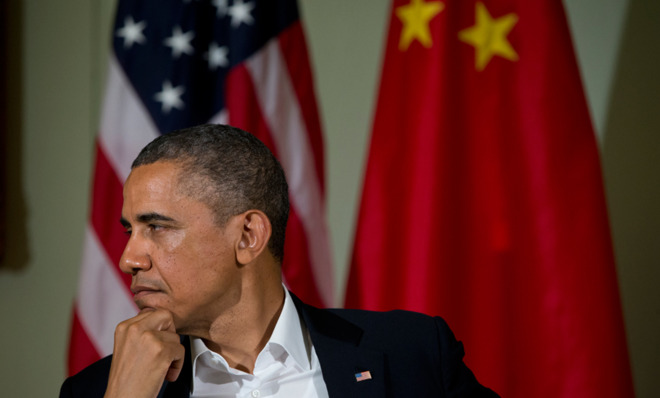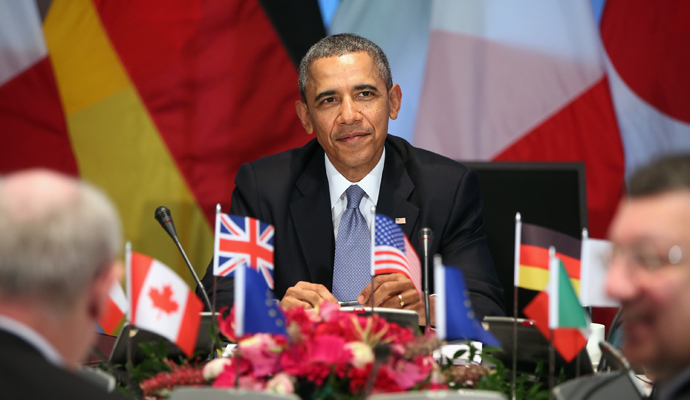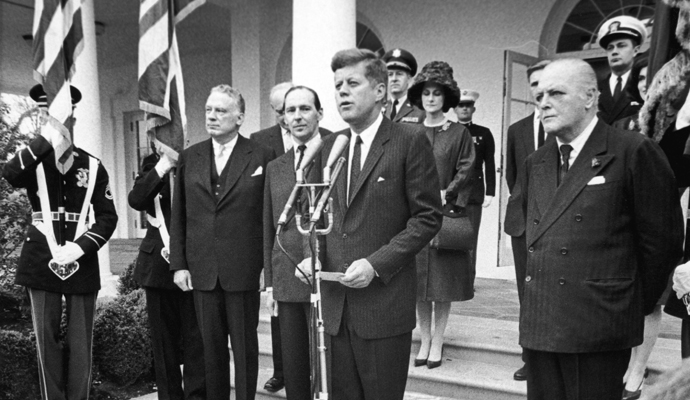No, China hasn't already replaced the U.S.
Reports of American decline have been greatly exaggerated


The Financial Times reported on April 30 that China is poised to replace the United States as the world's largest economy this year — five years earlier than expected — stripping the U.S. of a title that it has held since 1872. This development has intensified debate not only over whether China is now the world's foremost economic power, but also over whether it is on track to displace the U.S. for global preeminence.
Whether or not the United States is in decline, these are boom times for those who seek to answer that question. While some of the volumes that have been published on the subject in recent years have a lot to offer — particularly Time to Start Thinking: America in the Age of Descent (by Ed Luce, a consistently reliably penetrating observer of international order) and The Myth of America's Decline (by Josef Joffe, one of the most skilled anti-declinists) — it is hard to avoid the impression that today's declinists and anti-declinists are talking past one another.
Indeed, having gone through several cycles, the debate between the two camps has grown shriller over time. Those who argue that the U.S. is in decline contend that the anti-declinists fail to evaluate the country's present challenges objectively, trivializing them simply because past predictions of U.S. decline have failed. Those who argue that the U.S. is not in decline contend that the declinists have consistently failed to appreciate the country's regenerative capacity.
The Week
Escape your echo chamber. Get the facts behind the news, plus analysis from multiple perspectives.

Sign up for The Week's Free Newsletters
From our morning news briefing to a weekly Good News Newsletter, get the best of The Week delivered directly to your inbox.
From our morning news briefing to a weekly Good News Newsletter, get the best of The Week delivered directly to your inbox.
This tug of war seems poised to continue indefinitely, owing not only to contrasting worldviews but also to fluid debating terms. Are we discussing absolute or relative decline? What metrics (for example, share of gross world product or share of global defense spending) are we using to measure decline? And from what baseline (for example, the end of World War II or the onset of the global financial crisis) are we assessing whether the U.S. is in decline? Even more fundamentally, what does it mean for a country to be in decline?
Complicating this debate is observers' inability to agree on basic notions of measurement: what are the sources of "power" in the new century, and what it does mean to exercise "influence"? There is also a temporal challenge: because the threats to vital U.S. national interests continue to evolve, as does the configuration of the international system, how can one meaningfully compare U.S. influence at, say, the height of the Cold War with its influence today?
Perhaps the greatest limitation of the declinist debate, though, is not analytical, but prescriptive. Declinists too often sound the trumpet of resignation, as if an unwritten law of international relations consigns the U.S. to go the way of the Roman Empire; anti-declinists, meanwhile, too often leave themselves open to the charge of complacence, as if U.S. centrality is immutable.
It is more productive to focus on how the U.S. can reposition itself in the emerging environment. To that end, Bruce Jones's new book Still Ours to Lead is an important addition to the debate: it lays the foundation for a more sophisticated and constructive discourse on America's role in the world. While he begins with a familiar recitation of its strengths, he devotes the second part of his book to exploring the mentality of, and interactions between, rising powers. Jones's discussion paints a picture of international order that is considerably more nuanced, complex — and, ultimately, accurate — than the portrayals that either declinists or anti-declinists tend to offer. In his assessment, this very complexity can enable the U.S. to continue exercising a strong leadership role.
A free daily email with the biggest news stories of the day – and the best features from TheWeek.com
Jones, the director of the Brookings Institution's Project on International Order and Strategy, argues that the United States, if not a rising power, is a resilient one, whose core strengths have deep roots and numerous sources. He calls the country an "enduring" power — a useful characterization that I had not encountered before reading his book. The U.S. derives economic power not only from the size of its GDP, but also from its "lead in innovation and high-end products" and the global footprint of its corporations. It derives military power not only from the amount that it spends on defense, but also from "military spending by its allies" and "the accumulation of assets during almost a quarter century of post-Cold War spending." America's most important strength, however, is its "network of more than fifty allies," roughly half of which are "strong, close, [and] effective." With that deep a roster to draw upon, it remains uniquely situated to mobilize coalitions, both ad hoc and within formal, institutional arrangements.

Even with these formidable advantages, however, the United States could not sustain a liberal international order in the face of a unified non-Western bloc. The good news, and Jones's central proposition, is that rising powers possess both "the impulse to rivalry and the incentives for restraint," with the latter prevailing for now. In fact, there are significant "shared or overlapping interests between the established and emerging powers." Because cooperation between them receives less attention than competition, Jones spotlights their joint efforts to counter piracy in the Indian Ocean, prevent nuclear weapons and materials from falling into terrorist hands, and foster shared access to the Arctic region's prodigious energy bounty.
While it is not wrong to cite "the rise of the rest" as a — perhaps even the — dominant dynamic of international relations, neglecting the diversity of "the rest" can produce erroneous appraisals. Brazil, Russia, India, and China — the BRICs — are a case in point. Once vaunted as having the potential to become a strategic counterweight to the West, they are now discussed most often for their differences — in economic outlooks, political systems, and strategic priorities.
The simplicity of the declinist debate informs Jones's assertion that we are not living in a multipolar world — though he risks overplaying his hand on this point. He concedes, after all, that the further out one looks, "the more likely it is that China constitutes a genuine peer competitor," and notes that "much of the world's economic and financial agenda" going forward will be shaped "within the G-20 and among the G-20 members." Jones also opens the second-to-last chapter by concluding that one of the "two fundamental mistakes" the United States could make right now would be to "underestimate the importance of the rising powers." If none of the above makes for a world that is either multipolar or at least tending towards multipolarity, he should more explicitly define the characteristics of unipolarity, bipolarity, and multipolarity.
And even though Jones makes a strong case that fears about America's will and capacity to sustain international order are overblown, I wish that he would have done so more thoroughly, if only because a growing number of esteemed observers share or at least sympathize with those fears. David Ignatius observed this past December that "[f]oreign leaders worry that Obama doesn't see that U.S. power is fading," and in Gideon Rachman's judgment, "the most important emerging theme in world politics is America's slow retreat from its role as global policeman," which is opening "an emerging political and security vacuum."
Whether or not they are justified, these fears highlight the inaccuracy of referring to U.S. "hegemony," whether present or past. Echoing Robert Kagan, his colleague at Brookings, Jones rejects the suggestion that there once existed "an idyllic period of American leadership in which the country simply states its demand and allies and others followed unquestioningly." A study that identifies the origins of this ahistorical view, traces its evolution through the present, and accounts for its nearly axiomatic status in mainstream analysis, would be a major contribution to both scholarship and policy.

If one believes that Washington is squandering the hegemony that it once possessed — hegemony without which international order would soon devolve into chaos — one is likely to recommend policies to restore a global balance that has never existed and has a diminishing likelihood of occurring in the future. The essence of strategy is to develop policies that apportion limited means to objectives: it is impossible to design prudent policies if the proposed objective is illusory.
But the mistaken belief that the U.S. once exercised hegemony can also lead to an exaggeration of its current difficulties, and thus to misguided advocacy for retrenchment. Take last October's government shutdown, which many seized upon as evidence of systemic dysfunction and terminal decline in Washington. Jones notes that the last shutdown occurred from late November 1995 to early January 1996, when post-Cold War triumphalism was commonplace. Similarly, while the bloodletting in Syria marks another infuriating failure of multilateral cooperation, it "is hardly, in and of itself, a harbinger of American decline." In the 1990s, after all, while the U.S. was criticized for responding belatedly to carnage in Bosnia and Kosovo — and for doing nothing to halt genocide in Rwanda — those failures were not marshaled as evidence of its decline.
The United States is not a hegemon, then, and the global balance — especially its economic dimension — is becoming much more competitive. Still, Jones persuasively argues that the U.S. retains an unrivaled ability to lead in international affairs — an ability that both reflects and is reinforced by the absence of alternatives.
Despite sensible anxiety about the consequences of America's invasion of Iraq and entanglement in Afghanistan, the last decade did not sow a countervailing military coalition. Nor does one appear to be forming. If anything, as China adopts an increasingly assertive posture towards its neighbors and NATO considers how to resuscitate itself following Russia's incursion into Crimea, America's allies are seeking more robust ties with the world's military superpower.
A comparable story holds in the economic realm. Eswar Prasad, a senior fellow at Brookings and a professor of trade policy at Cornell University, noted in an article this March that the dollar's centrality in global finance has endured despite a number of phenomena that should have reduced its value and importance: our growing public debt; the first-ever downgrade to Uncle Sam's credit rating in August 2011; and the government shutdown this past October, following yet another round of fiscal brinkmanship. Attempting to explain the "almost childlike faith in the dollar," Prasad concluded in the aforementioned piece that it is "less a parable about American exceptionalism than about weaknesses in the rest of the world and deep problems in the structure of the global monetary system."
Whatever one's assessment about the current state and likely trajectory of U.S. influence, it is hard to identify a country or coalition that could replace the United States as the linchpin of international order. While this fact is perhaps the most compelling evidence that it is an enduring power, it may paradoxically pose the greatest long-term risk to U.S. leadership. If one concludes that no self-inflicted mistake or crisis abroad will jeopardize its centrality in the international system, one is likely to take that condition for granted. The fear is not so much that China will supplant the U.S. as the world's preeminent power or that rising powers will mount a wholesale revisionist challenge to the postwar system. Rather, it is that by virtue of its complacency — not doing enough to restore its economy, detoxify the political climate in Washington, and revitalize its alliances in Europe and Asia — the slow drip of relative U.S. decline and the continued rise of others will eventually intersect to leave the world without an anchor.
This outcome is not preordained. The U.S. can play a central role in revitalizing the international system — but not if it gets bogged down in an insoluble declinist debate and becomes preoccupied with remaining the world's largest economy. If it harnesses the full array of instruments that make it an enduring power, it need not be a bystander to the tectonic shifts afoot in today's world; it can guide the course that they take.
Sign up to get The Weekly Wonk, New America's digital magazine, delivered to your inbox each Thursday here.
More from The Weekly Wonk...
-
 World’s oldest rock art discovered in Indonesia
World’s oldest rock art discovered in IndonesiaUnder the Radar Ancient handprint on Sulawesi cave wall suggests complexity of thought, challenging long-held belief that human intelligence erupted in Europe
-
 Claude Code: the viral AI coding app making a splash in tech
Claude Code: the viral AI coding app making a splash in techThe Explainer Engineers and noncoders alike are helping the app go viral
-
 ‘Human trafficking isn’t something that happens “somewhere else”’
‘Human trafficking isn’t something that happens “somewhere else”’Instant Opinion Opinion, comment and editorials of the day